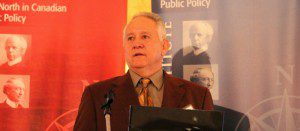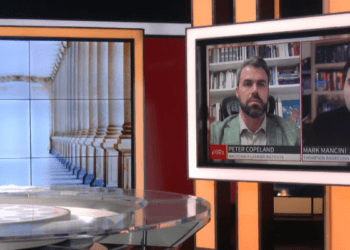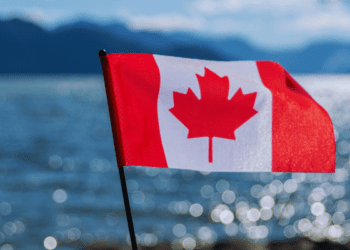On November 25, 2014, Dawson Strategic and the Macdonald-Laurier Institute (MLI) convened members of the Anti-Contraband Tobacco Working Group in Ottawa to engage with a panel of experts on the contraband issue in Canada, linkages between illicit tobacco and organized crime and terrorism, and policy options for the Canadian federal government.

The Anti-Contraband Tobacco Working Group is comprised of representatives from federal government departments, Aboriginal groups, the private sector, think tanks, and other organizations. Thirty-three individuals were in attendance, including speakers and representatives from Dawson Strategic and the Macdonald-Laurier Institute. Click here to read a discussion paper prepared for the event which highlights the extent of the contraband problem in Canada and covers a variety of policy options. Click here to read a statement of support from Interpol.
The event began with an invocation from Chief Steve Thomas of the Mohawk Council of Akwesasne.
MLI Executive Director Brian Lee Crowley acted as Chair for the session. The first part of the program consisted of presentations from each of the experts and the second half was a panel discussion with audience Q&A guided by Dr. Laura Dawson (President, Dawson Strategic).

Dr. Christian Leuprecht of the Royal Military College and Queen’s University is doing research with the Macdonald-Laurier Institute on the networks involved in contraband smuggling. His presentation – click here for Power Point slides – included some remarkable information:
• Canada’s illicit tobacco market is disproportionately large, estimated at 15-33% of all cigarettes consumed, compared to between 10.7% and 11.6% of cigarettes consumed worldwide.
• All estimates suggest the Canadian contraband tobacco market is larger in proportion to its population than that of any other Western state.
• There is room in Canada to curtail the contraband tobacco problem.
• The consequences of the problem go well beyond lost tax revenue; include threats to public health, corruption, and funding of organized crime and potentially terrorism.
• Criminal organizations are attracted to illicit tobacco because of high profit margins and low risk.
• Aboriginal groups are a key part of the solution and in some cases they have been hijacked by organized crime interests.
• There are a number of concrete policy recommendations for the federal government to consider:
o Increased awareness of Bill C-10, the recently passed anti-contraband legislation.
o Investigation into options for pursuing key input controls, particularly for acetate tow.
o Combine enforcement efforts with innovative approaches to federal-Aboriginal relations, including Aboriginal-administered taxation schemes.
o Explore the creation of a federal ombudsman to oversee contraband tobacco enforcement in Canada.
 Suzanne Hayden, president of FTM Global Recovery, and a former global prosecutor, also highlighted that contraband tobacco is not just a little tax problem. In her presentation she drew upon real cases to highlight the linkages between illicit tobacco trade and terrorism:
Suzanne Hayden, president of FTM Global Recovery, and a former global prosecutor, also highlighted that contraband tobacco is not just a little tax problem. In her presentation she drew upon real cases to highlight the linkages between illicit tobacco trade and terrorism:
• Once an illicit pipeline has been established, it can be used to traffic contraband tobacco, weapons, drugs, humans, etc.
• Co-operation and sharing of information is critical for effective enforcement.
• There is a need to focus on how to change the story from contraband being a “less serious, tax issue” to a very serious priority issue for law enforcement.
• As an experienced prosecutor and legal investigator, Ms. Hayden’s accounts of how “Mom and Pop” smuggling can have direct lines to Hezbollah and international terror were particularly poignant. She also pointed to instances were U.S. terrorist funding activities had Canadian links.
Dr. Vanessa Neumann, president and CEO of Asymmetrica and former adviser to the U.S. State Department and Defense Department, gave an overview of the global cellulose acetate tow market, which has major implications for contraband. Dr. Neumann – click here for Power Point slides – argued that controlling acetate tow, a key input for cigarettes, provides an opportunity to crack down on contraband. Dr. Neumann provided:
• A discussion of the extent of the illicit tobacco trade and the harms done by it.
• Examples of countries with substantial oversupply of acetate tow and how this translates into illegal manufacturing (e.g. Belarus, Paraguay).
• Description of the international legal framework governing illicit tobacco (INTERPOL, WHO FCTC, etc.).
• Recommendation for better supply chain control of key inputs built into OECD policy (modeled after OECD guidelines on conflict minerals).
Policy recommendations
The presentations were followed by an engaging Q&A session between panelists and the audience. A number of concrete policy recommendations arose from this portion of the meeting, including:
• Canada should investigate options for key input controls, particularly controlling the supply of acetate tow.
• The need to build awareness of Bill C-10 and ensure enforcement officers are equipped and trained to enforce its contents.
• Canada to sign and ratify the Protocol to Eliminate Illicit Tobacco Trade.
• Need to explore creative solutions such as Aboriginal-administered taxation schemes.
A second meeting is planned for February 25, 2014 in Toronto, Ontario. This meeting will again feature the research of Dr. Christian Leuprecht, but here the focus will be on the provincial dimensions of the contraband tobacco issue in Canada, with an emphasis on Ontario and Quebec.





